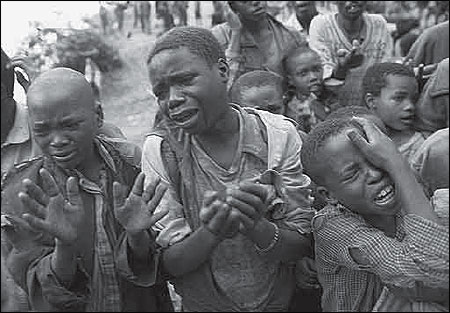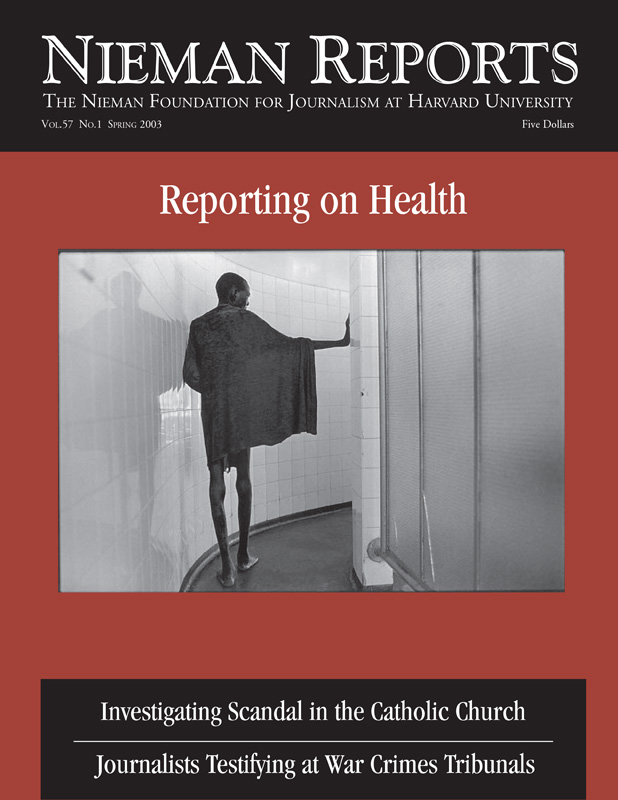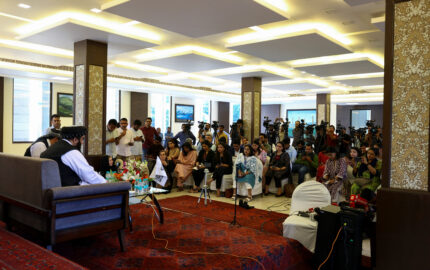
Rwandan refugee children plead with Zairean soldiers to allow them across a bridge separating Rwanda and Zaire where their mothers had crossed moments earlier before the soldiers closed the border in August 1994. Photo by Jean-Marc Bouju/The Associated Press.
In 1997, British journalist Lindsey Hilsum testified before the International Criminal Tribumal on Rwanda about events she’d witnessed while working in that country as a freelance journalist in 1994, primarily for the British Broadcasting Corporation. In this article, she describes why she agreed to testify.
The accused, dressed in a dark jacket, sat impassively staring ahead, just a few yards from me in the sweltering courtroom. The allegations: genocide and crimes against humanity. Jean-Paul Akayesu had been mayor of Taba, in central Rwanda, while villagers and militia under his control slaughtered thousands of people with machetes and nail-studded clubs. His was the first case to be heard by the International Criminal Tribunal on Rwanda in Arusha, Tanzania. On January 20, 1997, I took the stand as a witness for the prosecution.
Emmanuel Rudasingwa was planning to testify, too, but he was murdered before he could do so. His widow, Godlieve Mukarasasi, thought she knew why. Akayesu’s defenders were determined that anyone who knew anything about the campaign to wipe out the Tutsi people in his area would not make it to court in Arusha. Rudasingwa ran a small shop in Taba and was brave enough to talk to the tribunal investigators who visited the area. That is why he died. “Everyone knew Emmanuel was talking because they saw such a big car outside the door,” said Mukarasasi.
Deciding to Testify
American journalists argue that if we testify in war crimes tribunals we put our colleagues and ourselves at risk and might compromise our integrity and impartiality. British journalists— several of whom have testified at the tribunals on Rwanda and the former Yugoslavia—tend to take a less rigid stance, leaving the decision more to individual conscience. These stances seem to emerge out of differing experiences and perspectives: American journalists believe they have enormous influence on governments, but in Britain we rarely feel we make a difference. Journalism is not considered sacrosanct and, therefore, we should not exaggerate our own importance. In normal circumstances, journalists in Britain do not appear as witnesses for the prosecution or defense. But wars and the crimes that take place during them are anything but normal circumstances. Reporting matters, but sometimes justice matters more. The horror of what I saw in Rwanda was so great, normal rules no longer applied.
I believe that the United Nations was right to set up a special tribunal for Rwanda as a way of bringing justice to the perpetrators of a mass crime that ranks alongside the Holocaust and what happened in Cambodia. Who am I to say Emmanuel Rudasingwa should testify, but I should not? Hundreds of Rwandan peasants have risked everything to go to Arusha and tell the truth about what happened. Some have subsequently fled into exile, knowing the tribunal’s witness protection program cannot save them. Others have returned to their villages to be threatened or treated as outcasts. By contrast, I have continued my work as a journalist covering conflict, and I do not see any evidence that my actions have put other journalists in danger. A war correspondent’s job is more dangerous than it used to be because 24-hour satellite television has made combatants aware of the media, not because a handful of us have testified at these tribunals.
Testifying About Rwanda
I testified because, by accident of history, I witnessed one of the worst mass crimes of the 20th century. In April 1994, I was living in the Rwandan capital, Kigali. After the killing started, I was in constant touch by phone with the U.N. and with endangered Rwandan friends who sobbed as they described how bands of militia were combing their neighborhoods and slaughtering any Tutsis they could find. At night I listened to the rocket fire, but I grew to fear the silent times most because I learned that was when the armed gangs moved freely. While other journalists were still struggling to get into the country, I ventured onto the streets of Kigali. I will never forget the red-eyed drunken soldiers and militia at checkpoints, the hundreds of hacked bodies piled on trucks and buzzing with flies, nor the baby at the hospital whose severed leg was hanging by a tendon. I said in my testimony that I had thought the phrase “rivers of blood” was a metaphor, but in Kigali I saw gutters literally streaming red.
I was not asked to testify against Akayesu personally, but to provide evidence that his alleged crimes took place in a situation of war and that the killings were “widespread and systematic.” It could be argued that others might testify similarly or that my writing and broadcasting at the time would provide the same information. But the prosecution felt that I was a credible eyewitness, and the system requires that witnesses appear in person.
To my mind, the tribunal is not there solely to provide justice, but also to set down as definitive a record as possible of what happened. Already revisionists say that what happened in Rwanda was not really genocide, that somehow the main victims, the Tutsis, brought it on themselves. I wanted my account to be part of the historical record. Rwanda was not just another story, like dozens of others I have covered. As a journalist, I might argue against testifying but, as a human being, I could not. I did it because I believed it was the right thing to do.
In 2001, Jean Paul Akayesu was found guilty of genocide and crimes against humanity and sentenced to life imprisonment. Most of the alleged ringleaders of Rwanda’s genocide are now being tried or are awaiting trial in Arusha. These days, I try not to think about what I saw in Rwanda too much. But while researching this article, I read some recent testimony of a peasant woman from the southern Rwandan town of Butare, identified only by her initials, S.U., who wept in the courtroom as she described how her baby was hacked to death on her back, her four other children were also killed, and she, badly injured, was partly buried and left for dead. I reported as best I could in Rwanda. I did not change the course of history. I did not save anyone’s life. And then I returned home to my family and friends and career. I think the least I could do was to testify alongside the Rwandans who lost everyone and everything.
Lindsey Hilsum is diplomatic correspondent for Britain’s Channel 4 news, an hour-long nightly TV news program. Prior to this, she was a freelance journalist reporting mainly for the BBC.



